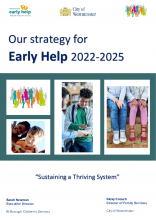Information for professionals
Criteria for referral to Westminster’s Targeted Early Help Service
Referrals will be accepted by our Targeted Early Help Service where there is evidence that work has been undertaken to enable the family to make changes over a period of time with multi-agency support. but has either resulted in no change or the negative impact on the children has increased over time.
Early Help will work with families where it is clear that without a the service those families would become the subject of a statutory intervention.
Early Help priorities
Children not attending school regularly.
Children with more than 10% unauthorised absence over the last term and where the school actions are not having an impact. The absence must be related to parenting capacity rather than ill health or a conduct disorder.
By parenting capacity we mean a parents ability to meet their child’s health and developmental needs and being able to acknowledge problems and engage with support services to effect change.
Factors that may prevent a parent/s engaging with support are mental health issues, substance misuse, domestic violence and those with poor experience of being parented themselves.
- A child with a fixed term exclusion of at least 10 days in primary school or year 7 that is a direct result of parenting incapacity.
- Three fixed term exclusions in primary school or year 7, which is a direct result of parenting incapacity.
- A child who is permanently excluded and not known to other teams in family services.
Prevention of children and young people committing offences
A child who has committed a proven offence – low level and a first offence - that meets the requirements for triage.
Parenting capacity manifesting itself in significant behavioural issues
Children where the impact of the parent’s mental health, domestic abuse or substance misuse issues on their behaviour and well-being will escalate the family into safeguarding or care entry without further intervention.
A younger child, where an older sibling has been convicted of serious youth violence or supplying drugs offences or is a known gang nominal.
Other children who need help
Children who are repeatedly (two assessments in one year) assessed under section 17 or 47 but do not subsequently require a child in need or child protection plan.
A child who we have identified as a young carer following referral, and whose needs cannot be met through existing provision.
How to make a referral
Before making a referral, please ensure that the child or children and their family live in Westminster, you can do this by completing a postcode check available on GOV.UK.
To complete a referral, use the link below to visit the Social Care Portal where you will be asked to complete the Westminster Multi Agency Referral Form (MARF). Please take time to read the important information below prior to submitting a referral.
Please note, the Social Care Portal is a new digital solution which has replaced our previous online MARF Portal, it is a shared site with the Royal Borough of Kensington. Any referrals to Westminster MARF will only be submitted to Westminster Children’s Services.
In the unlikely event that you experience any difficulties when trying to submit a referral, please get in touch with us directly by calling 0207 641 4000 or emailing us at [email protected].
Important information
Before beginning, please ensure that you have obtained agreement from the parent(s) to make a referral.
For security reasons, we advise against using a public computer to complete the form, as it may expose your personal details or those of the person you are referring.
The form may take up to 20 minutes to complete. Please be aware that if there is no activity on the form for more than 20 minutes, any progress will be lost and you will need to start the form again.
Some sections of the MARF are mandatory to complete, this is to ensure that we receive all the information we need for a referral to be processed.
After completion, make sure to click the 'Submit' button. You will then have an opportunity to save, print, and download a copy of the form. You will also be emailed a copy of the completed referral for your records. If you do not receive an email receipt, please check your junk mail.
To protect personal information, please click the 'Close' button and close the browser completely after you have finished.
If the referral is related to poor school attendance, you will be asked to attach a school attendance certificate in one of the following file formats: .doc, .docx, .pdf, .jpg, .png, .jpeg, .gif.
Fill in the Multi Agency Referral Form
When should I complete a MARF?
- If you are worried about a behaviour, incident or information you have received
- If you require more information to help you plan next steps to address an issue
- If the child, young person or family needs cannot be met by a single agency
- If a parent expresses concerns
Undertaking a MARF Assessment will help you to:
- identify needs and explore any concerns
- address emerging multiple needs
- promote early help services where additional needs are identified
- create packages of tailored support
- coordinate support and involvement through a named Lead Professional
- share information effectively and appropriately
- reduce the number of times a family needs to tell their story
London Safeguarding Children Procedures
When dealing with any referral to the service we adhere to the London Safeguarding Children Procedures.
Further information can also be found on the Local Safeguarding Children Partnership for Kensington and Westminster.

